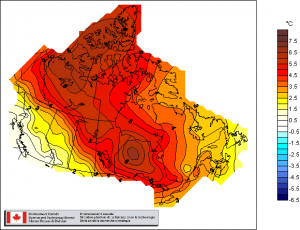Earlier this year, we published a backgrounder assessing recent controversies and claims surrounding the integrity of climate science. There have been several new developments since then, so we thought it would be useful to summarize the main ones.
In line with the earlier investigations summarized in our backgrounder, the more recent reviews find that the allegations made about the "climategate" stolen e-mails affair or errors in volume II of the Intergovernmental Panel on Climate Change's Fourth Assessment Report (IPCC AR4) are either baseless or have no bearing on the case for urgent reductions in greenhouse gas pollution.
As the U.S. Environmental Protection Agency (EPA) said, "many of the concerns about the emails appear to be based on a misunderstanding of the importance of certain issues and how concerns raised about a specific issue or study relate to the fundamental conclusions reached through the assessment of hundreds of scientific studies; in other words a misunderstanding that results in an exaggeration of the importance of these issues."
We're not clairvoyant for having predicted these conclusions. In truth, it's pretty simple: the hyped-up allegations made against climate science crumple under dispassionate scrutiny.
- The Independent Review of the stolen e-mails, led by Sir Muir Russell, has cleared researchers of misconduct and given climate science a clean bill of health. This thorough investigation found that the researchers' "rigour and honesty as scientists are not in doubt." Importantly, the Review "[did] not find that their behaviour has prejudiced the balance of advice given to policy makers." Yes, the review panel criticized the scientists for their lack of openness when dealing with critics, but also pointed out that it was able to replicate the scientists' key results with publically available information in less than two days.
- The U.S. EPA has also assessed the e-mails and found no reason to doubt the validity or robustness of the climate data in question nor of the IPCC's assessments. "The disclosure of the private communications of a few individual scientists, among the hundreds of scientists that have participated in the development of the IPCC reports and the thousands that have developed the literature that was assessed, provides no evidence that contradicts the key conclusions and basic science underlying climate change."
- At the request of the Dutch Parliament, the Netherlands Environmental Assessment Agency (PBL) studied the alleged errors in the IPCC Fourth Assessment Report's regional impacts chapters and summaries. It found no errors that undermine the IPCC's conclusions, but acknowledged that some summary statements could be more clearly referenced. In addition to the two known errors within the regional chapters — those relating to the Himalayan glaciers and the portion of the Netherlands lying below sea-level (which the PBL itself has acknowledged responsibility for) — one error was found related to the productivity of anchovy fisheries on Africa's west coast. "Overall the summary conclusions are considered well founded and none were found to contain any significant errors. The Working Group II contribution to the Fourth Assessment Report shows ample observational evidence of regional climate-change impacts, which have been projected to pose substantial risks to most parts of the world, under increasing temperatures."
- A panel appointed by Pennsylvania State University has unanimously cleared Professor Michael Mann of improper academic conduct, the fourth and final issue under investigation by the university.
- The Sunday Times has printed a full retraction of its grotesquely misrepresentative "Amazongate" story, admitting that, in fact, there was no "bogus rainforest claim" and that one of the experts quoted did not hold the views attributed to him.
 The science continues to pile up, including the first four volumes of the U.S. National Research Council's most comprehensive review of climate change to date and an extensive assessment of 37 climatic indicators that "confirms the world is warming and the past decade was the warmest on record" and The spring of 2010 was Canada's hottest on record at 4.1˚C above normal, according to Environment Canada. finds that "global warming is undeniable."
The science continues to pile up, including the first four volumes of the U.S. National Research Council's most comprehensive review of climate change to date and an extensive assessment of 37 climatic indicators that "confirms the world is warming and the past decade was the warmest on record" and The spring of 2010 was Canada's hottest on record at 4.1˚C above normal, according to Environment Canada. finds that "global warming is undeniable."
Meanwhile, the human toll from more frequent extreme weather — a predicted consequence of climate change — is becoming increasing and tragically evident around the world.
As the editorial board of the New York Times recently put it, "[p]erhaps now we can put the manufactured controversy known as Climategate behind us and turn to the task of actually doing something about global warming."
P.J. Partington was a senior analyst with the Pembina Institute's federal policy group until 2015.



